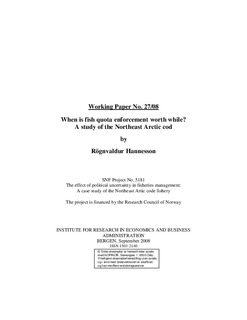| dc.contributor.author | Hannesson, Rögnvaldur | |
| dc.date.accessioned | 2009-05-05T08:09:09Z | |
| dc.date.available | 2009-05-05T08:09:09Z | |
| dc.date.issued | 2008-09 | |
| dc.identifier.issn | 1503-2140 | |
| dc.identifier.uri | http://hdl.handle.net/11250/166054 | |
| dc.description.abstract | Many fish stocks are controlled by fish quotas divided among individual firms. Such quota regimes need an enforcement mechanism in order to be effective. Whether or not quota management regimes are worth while depends on whether the rents generated by such regimes cover their costs. Cost-efficient quota regimes would attain an optimal deterrence through minimal control and high fines, but in practice there are likely to be socially-determined limits on how high fines could be set. For shared stocks, the optimal degree of enforcement in one country depends critically on the degree of enforcement achieved by the other countries involved. We analyze these questions for the Northeast Arctic cod stock, using data on enforcement of Norwegian fish quotas. | en |
| dc.language.iso | eng | en |
| dc.publisher | SNF | en |
| dc.relation.ispartofseries | Working paper | en |
| dc.relation.ispartofseries | 2008:27 | en |
| dc.title | When is fish quota enforcement worth while? : a study of the Northeast Arctic cod | en |
| dc.type | Working paper | en |
| dc.subject.nsi | VDP::Landbruks- og Fiskerifag: 900::Fiskerifag: 920 | en |
